大学英语book2课文翻译
新视野大学英语读写教程(第三版)Book2 Unit 3课文讲解
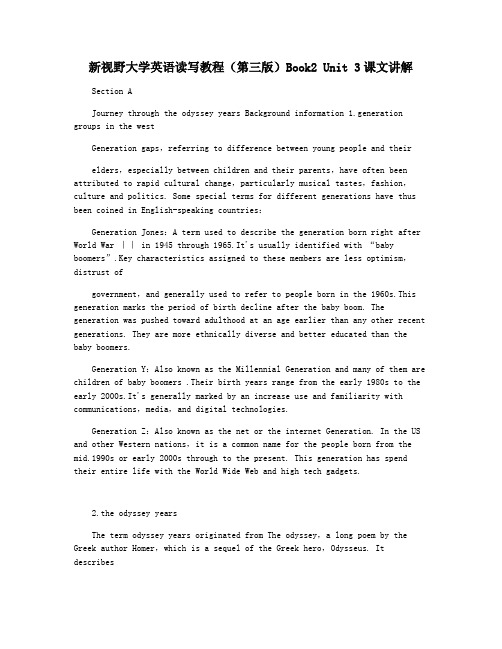
新视野大学英语读写教程(第三版)Book2 Unit 3课文讲解Section AJourney through the odyssey years Background information 1.generation groups in the westGeneration gaps,referring to difference between young people and theirelders,especially between children and their parents,have often been attributed to rapid cultural change,particularly musical tastes,fashion,culture and politics. Some special terms for different generations have thus been coined in English-speaking countries:Generation Jones:A term used to describe the generation born right after World War ||in 1945 through 1965.It's usually identified with “baby boomers”.Key characteristics assigned to these members are less optimism,distrust ofgovernment,and generally used to refer to people born in the 1960s.This generation marks the period of birth decline after the baby boom. The generation was pushed toward adulthood at an age earlier than any other recent generations. They are more ethnically diverse and better educated than the baby boomers.Generation Y:Also known as the Millennial Generation and many of them are children of baby boomers .Their birth years range from the early 1980s to the early 2000s.It's generally marked by an increase use and familiarity with communications,media,and digital technologies.Generation Z:Also known as the net or the internet Generation. In the US and other Western nations,it is a common name for the people born from the mid.1990s or early 2000s through to the present. This generation has spend their entire life with the World Wide Web and high tech gadgets.2.the odyssey yearsThe term odyssey years originated from The odyssey,a long poem by the Greek author Homer,which is a sequel of the Greek hero,Odysseus. It describesOdysseus's long journey,trying to return home from adventures and war.For English speakers,as many as for many cultures,the very name of poem,The Odyssey,has become a special term for an epic journey,or great struggle. The man character in the epic poem(史诗),Odysseus,was wandering away from home and loved ones. During his journey of 10 years,he encountered repeatedtroubles and challenges. The key insight in Odyssey is that the essentials of the journey are not only outward struggle against tremendous difficulties,but,more importantly,inward struggles leading to personal growth. His journey is the one of self-discovery and of combating his ownarrogance and pride from his young rebel heart. Therefore, it makes senseto borrow The Odyssey from Greek mythology to describe the rebellious years young people usually go through. The term odyssey year is a metaphor of this special stage for young people.Detailed study of the text1Most of us know about the phases of life which we label to parallel different agegroups and life stages childhood, adolescence, adulthood, and oldage.(Para.1)Meaning: Most of us know about he different life stages that we describe according to different age groups: childhood, adolescence, adulthood, and old age.phase:n.[C] one of the sages of a process of development or change 阶段;时期 As time are changing, we?re entering a new phase in internationalrelation.随着时代的变化,我们正进入国际关系的新阶段。
现代大学英语精读Book2Unit10 Pompeii 课文原文

Pompeii1 Not very far from Naples, a strange city sleeps under the hot Italian sun. It is the city of Pompeii, and there is no other city quite like it in all the world. Nothing lives in Pompeii except crickets and beetles and lizards, yet every year thousands of people travel from distant countries to visit it.2 Pompeii is a dead city. No one has lived there for nearly two thousand years—not since the summer of the year AD 79, to be exact.3 Until that year Pompeii was a prosperous city of 25,000 people. Nearby was the bay of Naples, an arm of the blue Mediterranean. Rich men came down from wealthy Rome to build seaside villas. Farmlands surrounded Pompeii. Rising behind the city was the 4,000-foot Mount Vesuvius, a grass-covered slope where the shepherds of Pompeii took their goats to graze. Pompeii was a busy city and a happy one.4 It died suddenly, in a terrible rain of fire and ash. The tragedy struck on the 24th of August, AD 79. Mount Vesuvius, which had slept quietly for centuries, erupted with savage violence. Tons of hot ash fell on Pompeii, hiding it from sight. For three days the sun did not break through the clouds of volcanic ash that filled the sky. And when the eruption ended, Pompeii was buried deep. A city had perished.5 Centuries passed…Pompeii was forgotten. Then, seventeen hundred years later, it was discovered again. Beneath the protecting shroud of ash, the city lay intact. Everything was as it had been the day Vesuvius erupted. There were still loaves of bread in the ovens of the bakeries. In the wine shops, the wine jars were in place, and on one counter could be seen a stain where a customer had thrown down his glass and fled.6 To go to Pompeii today is to take a trip backward in time. The old city comes to life all around you. You can almost hear the clatter of horses’ hoofs on the narrow streets, the cries of children and the laughter of the shopkeepers. The sky is cloudlessly blue, with the summer sun high in the sky. The grassy slopes of great Vesuvius rise to the heavens behind the city, and sunlight shimmers on the waters of the bay a thousand yards from the city walls. Ships from every nation are in port and strange languages can be heard in the streets.7 Such was Pompeii on its last day. And so it is today, now that the volcanic ash has been cleared away. A good imagination is all you need to restore it to activity.8 At dawn on August 24, in the year AD 79, Pompeii’s 25,000 people awakened to another hot day in that hot summer. There was going to be a contest in the arena that night and the whole town was looking forward to the bloody fights of the gladiators. The children headed toward school, carrying slates and followed by their dogs, In the forum the town’s important men had gathered after breakfast to read the political signs that had been posted during the night. Elsewhere in the forum the wool merchants talked business. The banker was going over his account books. At the inn late-rising travelers from the East awakened and yawned and called for breakfast.9 The quiet morning moved slowly along. There was nothing very unusual about Pompeii. But tragedy was on its way. Beneath Vesuvius’ vine-covered slopes a mighty force was about to break loose. At one o’clo ck in the afternoon the critical point was reached. The mountain blew up, raining death on thousands. Down in Pompeii, for miles from the summit, a tremendous explosion was heard.10 “What was that?”People cried from one end of town to another. They stared at each other, puzzled, troubled. Were the gods fighting in heaven?11 “Look!” somebody shouted. “Look at Vesuvius!”12 Thousands of eyes turned upward. Thousands of arms pointed. A black cloud was rising from the shattered of the mountain. Higher and higher it rose. Like the trunk of a tree, it rose in the air, branching out as it climbed.13 Minutes passed. The sound of the explosion died away, but it still reverberated in everyone’s ears. The cloud over Vesuvius continued to ris e, black as night, higher and higher. A strange rain began to fall on Pompeii-a rain of stones. The stones were light. They were pumice stones, consisting mostly of air bubbles. These poured down as though there had been a sudden cloudburst. The pumice stones did little damage.14 “What is happening?” Pompeiians asked one another. They rushe d to the temples-the Temple of Jupiter, the Temple of Apollo, the Temple of Isis. Priests tried to calm the citizens. The sky was dark. An hour went by and darkness still shrouded everything. All was confusion. The people of Pompeii now knew that doom was at hand. Their fears were redoubled when atremendous rain of hot ash began to fall. The wooden of some of the houses began to catch fire as the ash reached them. Other buildings were collapsing under the weight of the pumice stones.15 In these first few hours, only the quick-witted managed to escape. A wealthy wool merchant called his family together and crammed jewelry and money into a sack. Lighting a torch, he led his little band out into the nightmare of the streets. Many hundreds of Pompeiians fled in those first few dark hours. Stumbling in the darkness, they made their way to the city gates, then out and down to the harbor. They boarded boats and got away, living to tell the tale of their city’s destruction. Other preferred to remain within the city, huddling inside the temples, or in the public baths or in the cells of their homes. They still hoped the nightmare would end.16 It was evening now. And a trouble was in store for Pompeii. The earth trembled and quaked! Roofs went crashing in ruin, burying hundreds who had hoped to survive the eruption. In the forum the tall columns toppled. The entire city seemed to shake in the grip of a giant fist.17 Three feet of pumice stones now covered the ground. Ash floated in the air. Poisonous gas came drifting from the crater, though people could still breathe. Roofs were collapsing everywhere. The cries of the injured and dying filled the air. Rushing throngs, blinded by the darkness and the smoke, rushed up one street and down the next, trampling the fallen in a crazy fruitless dash toward safety, Dozens of people plunged into dead-end streets and found themselves trapped by crashing buildings. They waited there, too frightened to run further, expecting the end.18 The poison gas thickened as the terrible night advanced. It was possible to protect oneself from the pumice stones but not from the gas, and Pompeiians died by the hundreds. Carbon monoxide gas prevents the body from absorbing oxygen. Victims of carbon monoxide poisoning get sleepier until they lose consciousness, never to regain it. All over Pompeii, people lay down n beds of pumice stones, overwhelmed by the gas, and death came quietly to them.19 All though the endless night, Pompeiians wandered about the streets or crouched in their ruined homes or clustered in the temples to pray. By morning few remained alive. Not once had Vesuvius stopped hurling pumice stones and ash into the air, and the streets of Pompeii were filling quickly. At midday on August 25, exactly twenty-four hours after the beginning ofthe first eruption, a second eruption occurred. A second cloud of ash rose above Vesuvius’summit. The wind blew ash as far as Rome. But most of the new ash descended on Pompeii. 20 The deadly shower of stones and ash went into its second day. But it no longer mattered to Pompeii whether the eruption continued another day or another year. For by midday on August 25, Pompeii was a city of the dead.。
新世纪大学英语 2 课文 翻译 6.The Creative Personality
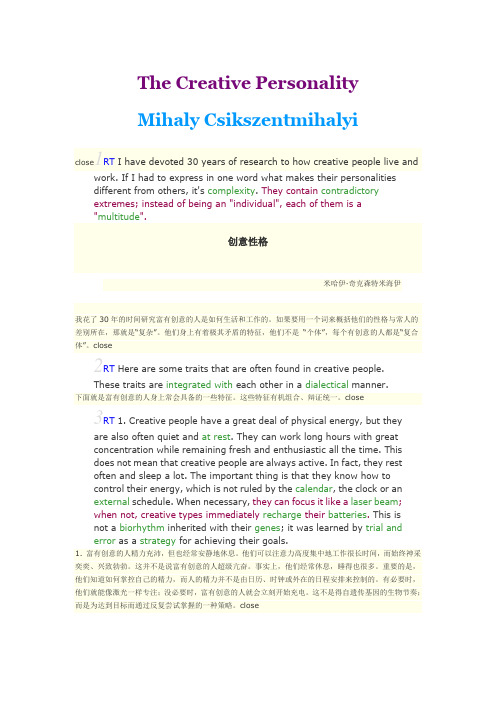
The Creative PersonalityMihaly Csikszentmihalyiclose1RT I have devoted 30 years of research to how creative people live and work. If I had to express in one word what makes their personalitiesdifferent from others, it's complexity. They contain contradictoryextremes; instead of being an "individual", each of them is a"multitude".创意性格米哈伊·奇克森特米海伊我花了30年的时间研究富有创意的人是如何生活和工作的。
如果要用一个词来概括他们的性格与常人的差别所在,那就是“复杂”。
他们身上有着极其矛盾的特征,他们不是“个体”,每个有创意的人都是“复合体”。
close2RT Here are some traits that are often found in creative people.These traits are integrated with each other in a dialectical manner.下面就是富有创意的人身上常会具备的一些特征。
这些特征有机组合、辩证统一。
close3RT 1. Creative people have a great deal of physical energy, but theyare also often quiet and at rest. They can work long hours with greatconcentration while remaining fresh and enthusiastic all the time. Thisdoes not mean that creative people are always active. In fact, they restoften and sleep a lot. The important thing is that they know how tocontrol their energy, which is not ruled by the calendar, the clock or anexternal schedule. When necessary, they can focus it like a laser beam;when not, creative types immediately recharge their batteries. This isnot a biorhythm inherited with their genes; it was learned by trial anderror as a strategy for achieving their goals.1. 富有创意的人精力充沛,但也经常安静地休息。
大学英语精读第二册课后翻译答案
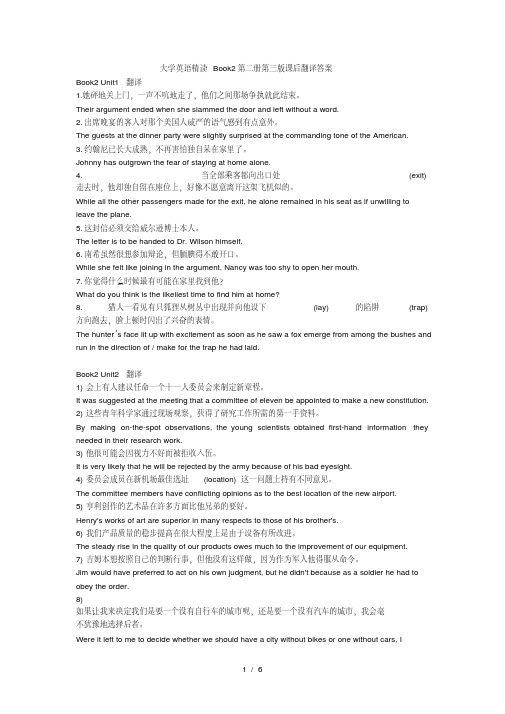
大学英语精读Book2第二册第三版课后翻译答案Book2 Unit1 翻译1.她砰地关上门,一声不吭地走了,他们之间那场争执就此结束。
Their argument ended when she slammed the door and left without a word.2. 出席晚宴的客人对那个美国人威严的语气感到有点意外。
The guests at the dinner party were slightly surprised at the commanding tone of the American.3. 约翰尼已长大成熟,不再害怕独自呆在家里了。
Johnny has outgrown the fear of staying at home alone.4. 当全部乘客都向出口处(exit) 走去时,他却独自留在座位上,好像不愿意离开这架飞机似的。
While all the other passengers made for the exit, he alone remained in his seat as if unwilling to leave the plane.5. 这封信必须交给威尔逊博士本人。
The letter is to be handed to Dr. Wilson himself.6. 南希虽然很想参加辩论,但腼腆得不敢开口。
While she felt like joining in the argument, Nancy was too shy to open her mouth.7. 你觉得什么时候最有可能在家里找到他?What do you think is the likeliest time to find him at home?8. 猎人一看见有只狐狸从树丛中出现并向他设下(lay) 的陷阱(trap) 方向跑去,脸上顿时闪出了兴奋的表情。
The hunter’s face lit up with excitement as soon as he saw a fox emerge from among the bushes and run in the direction of / make for the trap he had laid.Book2 Unit2 翻译1) 会上有人建议任命一个十一人委员会来制定新章程。
大学英语精读第二册7-10第三册1-3课后翻译答案
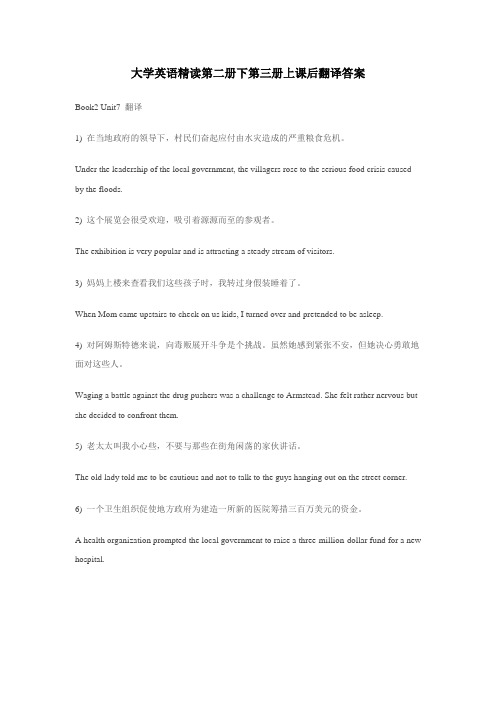
大学英语精读第二册下第三册上课后翻译答案Book2 Unit7 翻译1) 在当地政府的领导下,村民们奋起应付由水灾造成的严重粮食危机。
Under the leadership of the local government, the villagers rose to the serious food crisis caused by the floods.2) 这个展览会很受欢迎,吸引着源源而至的参观者。
The exhibition is very popular and is attracting a steady stream of visitors.3) 妈妈上楼来查看我们这些孩子时,我转过身假装睡着了。
When Mom came upstairs to check on us kids, I turned over and pretended to be asleep.4) 对阿姆斯特德来说,向毒贩展开斗争是个挑战。
虽然她感到紧张不安,但她决心勇敢地面对这些人。
Waging a battle against the drug pushers was a challenge to Armstead. She felt rather nervous but she decided to confront them.5) 老太太叫我小心些,不要与那些在街角闲荡的家伙讲话。
The old lady told me to be cautious and not to talk to the guys hanging out on the street corner.6) 一个卫生组织促使地方政府为建造一所新的医院筹措三百万美元的资金。
A health organization prompted the local government to raise a three-million-dollar fund for a new hospital.7) 那个曾放火烧教堂的男子打开门时,迎面遇到十来个持枪的警察。
新视野大学英语2读写教程课文翻译
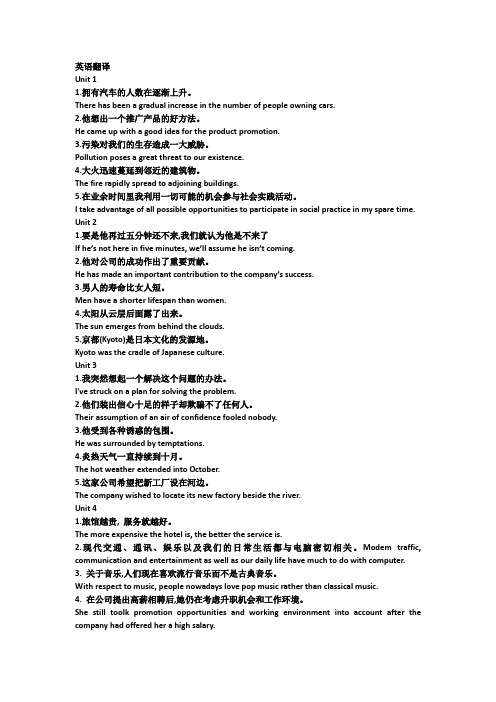
英语翻译Unit 11.拥有汽车的人数在逐渐上升。
There has been a gradual increase in the number of people owning cars.2.他想出一个推广产品的好方法。
He came up with a good idea for the product promotion.3.污染对我们的生存造成一大威胁。
Pollution poses a great threat to our existence.4.大火迅速蔓延到邻近的建筑物。
The fire rapidly spread to adjoining buildings.5.在业余时间里我利用一切可能的机会参与社会实践活动。
I take advantage of all possible opportunities to participate in social practice in my spare time. Unit 21.要是他再过五分钟还不来,我们就认为他是不来了If he’s not here in five minutes, we’ll assume he isn’t coming.2.他对公司的成功作出了重要贡献。
He has made an important contribution to the company’s success.3.男人的寿命比女人短。
Men have a shorter lifespan than women.4.太阳从云层后面露了出来。
The sun emerges from behind the clouds.5.京都(Kyoto)是日本文化的发源地。
Kyoto was the cradle of Japanese culture.Unit 31.我突然想起一个解决这个问题的办法。
I've struck on a plan for solving the problem.2.他们装出信心十足的样子却欺骗不了任何人。
新视野大学英语第三版 book 2 翻译+填空
Unit 11.中国书法(calligraphy)是一门独特的艺术、是世界上独一无二的艺术瑰宝。
Chinese calligraphy is a unique art and the unique art treasure in the world2.中国书法艺术的形成,发展与汉文字的产生与演进存在着密不可分的关系。
The formation and development of the Chinese calligraphy is closely related to the emergence and evolution of Chinese characters.3.汉字在漫长的演变发展过程中,一方面起着交流思想、继承文化的重要作用,另一方面它本身又形成了一种独特的艺术。
In this long evolutionary process, Chinese characters have not only played an important role in exchanging ideas and transmitting culture but also developed into a unique art form. 4.书法能够通过作品把书法家个人的生活感受、学识、修养、个性等折射出来,所以,通常有“字如其人”的说法。
Calligraphic works well reflect calligraphers' personal feelings, knowledge, self-cultivation, personality, and so forth, thus there is an expression that "seeing the calligrapher's handwriting is like seeing the person".5.中国书法不仅是中华民族的文化瑰宝,而且在世界文化艺术宝库中独放异彩。
新视野大学英语book2-unit7翻译
新视野大学英语B o o k2-U n i t7翻译(共2页)--本页仅作为文档封面,使用时请直接删除即可----内页可以根据需求调整合适字体及大小--Unit7, Book 2Optional Listening 1Mark: I participated in the Nebuta Festival last August. It was a lot of fun! First, I went to a local shop to rent a haneto--- that’s the costume you wear. It’s easy …..anyone can do it and anyone can dance in the festival. The parade is loud and beautiful. People beat drums and dance around. The only bad part was when I injured my ankle from too much dancing! At night, after the parade, we watched some beautiful floats go down the river.Marissa: I spent two months traveling through India with my best friend. One of my best memories is the Holi Festival. WE went to a local store and bought some colored powder. Then we mixed it with water. On the day of the festival, someone gave me a water pistol. I filled it with my colored water and started shooting everyone. I even sprayed a police officer! What a mess! It took a long time before the color came out of my skin.背景知识:Nebuta Festival: 睡魔节于8月2日到7日在位于日本主岛本州北端的青森市举行。
全新版大学英语综合教程 B2 U4 (课文及翻译)
Integrated Course Book 2 Unit 4Listen to the recording two or three times and then think over the following questions:1. Is the hero a student or an employee?2. What was he doing when the boss came in?3. How did he act in front of his boss?4. Can you guess what the texts in this unit are going to be about?The following words in the recording may be new to you:surf vt.(在网上)漫游log onto 进入(计算机系统)unpredictable a.不可预测的When an idle moment turned up at work, people used to reach for the newspaper, providing the boss wasn't looking. Nowadays they are more likely to spend their spare moments surfing the Internet. Needless to say, the boss is usually no more happier than before, thinking that his staff should be looking for some useful work to do. So what happens to the surfer who hears the boss's footsteps approaching? This is the situation the writer of the poem you are about to hear found himself in. Will he be caught in the act?Surfing the InternetStepping into the lab,I found no one is inside.So I think I'm in the clearBecause the boss is nowhere in sight.I log onto the web and start to surfAnd then my hair stands up with fright.The footsteps coming down the hallAre quickening in pace.There is no time to exit,No way to save my face.So I press the power buttonAnd relax just a bit.There is no way he can tellExactly what I hit.I act all surprised,Don't know why my machine died."Simply unpredictable theseComputers are!" I cried."So we'll get you a new one,A computer that won't crash", he exclaims.Do you think he'll wonderWhen the new one acts the same?intergrated courseMaia Szalavitz, formerly a television producer, now spends her timeas a writer. In this essay she explores digital reality and itsconsequences. Along the way, she compares the digital world to the "real"world, acknowledging the attractions of the electronic dimension.迈亚·塞拉维茨曾是电视制片人,目前从事写作。
新标准大学英语Book2 Unit1 college culture
•
•
热爱· · · · · ·
与· · · · · · 的距离缩小
Useful expressions
1. 一阵烟雾
2. 刺激的经历 3. 将· · · · · · 变成
1. a haze of smoke
2. stimulating experience 3. transform… into
4. 持不同意见的少数人
passionate resignation
heady decending employability affordability accessibility
Para.7-Para.10 revolution umbilically
obscure
bliss
New words
Para.1-Para.2 haze
not different from the real world
Comprehending the text
Page 4
Group 1 read Para. 1-4 to check the true statements about the 1960s.
1. students at the University of California, Berkeley did not protest. 2. students in Europe and the US spent a lot of time protesting. 3. there was violence on university campuses in Europe. 4. students and workers went on strike together in France. 5. the UK Prime Minister had to resign because of student protests. 6. students discovered a sense of freedom on campus.
- 1、下载文档前请自行甄别文档内容的完整性,平台不提供额外的编辑、内容补充、找答案等附加服务。
- 2、"仅部分预览"的文档,不可在线预览部分如存在完整性等问题,可反馈申请退款(可完整预览的文档不适用该条件!)。
- 3、如文档侵犯您的权益,请联系客服反馈,我们会尽快为您处理(人工客服工作时间:9:00-18:30)。
大学英语book2课文翻译大学英语book2课文翻译翻译是在准确、通顺的基础上,把一种语言信息转变成另一种语言信息的行为。
下面,是大学英语book2课文翻译的内容,提供给大家参考学习!大学英语book2课文翻译Unit 1 Are You a 1960s Type Student? 大学已不再特别了If you can remember anything about the 1960s, you weren't really there," so the saying goes. It may be true for those who spent their college years in a haze of marijuana smoke. But there is one thing everyone remembers about the 1960s: Going to college was the most exciting and stimulating experience of your life.In the 1960s, California's colleges and universities had transformed the state into the world's seventh largest economy. However, Berkeley, the University of California's main campus, was also well-known for its student demonstrations and strikes, and its atmosphere of political radicalism. When Ronald Reagan ran for office as governor of California in 1966, he asked if Californians would allow "a great university to be brought to its knees by a noisy, dissident minority". The liberals replied that it was the ability to tolerate noisy, dissident minorities which made universities great.On university campuses in Europe, mass socialist or communist movements gave rise to increasingly violent clashes between the establishment and the college students, with their new and passionate commitment to freedom and justice. Much of the protest was about the Vietnam War. But in France, the students of the Sorbonne in Paris managed to form an alliancewith the trade unions and to launch a general strike, which ultimately brought about the resignation of President de Gaulle.It wasn't just the activism that characterized student life in the 1960s. Everywhere, going to college meant your first taste of real freedom, of late nights in the dorm or in the Junior Common Room, discussing the meaning of life. You used to have to go to college to read your first forbidden book, see your first indie film, or find someone who shared your passion, for Jimi Hendrix or Lenny Bruce. It was a moment of unimaginable freedom, the most liberating in your life:But where's the passion today? What's the matter with college? These days political, social and creative awakening seems to happen not because of college, but in spite of it. Of course, it's true that higher education is still important. For example, in the UK, Prime Minister Blair was close to achieving his aim of getting 50 per cent of all under thirties into college by 2010 (even though a cynic would say that this was to keep them off the unemployment statistics). Yet college education is no longer a topic of great national importance. T oday, college is seen as a kind of small town from which people are keen to escape. Some people drop out, but the most apathetic stay the course because it's too much effort to leave.Instead of the heady atmosphere of freedom which students in the1960s discovered, students today are much more serious. The British Council has recently done research into the factors which help international students decide where to study. In descending order these are: quality of courses, employability prospects, affordability, personal security issues, lifestyle, and accessibility. College has become a means to an end, an opportunity to increase one's chances on the employmentmarket, and not an end in itself, which gives you the chance to imagine, just for a short while, that you can change the world.The gap between childhood and college has shrunk, and so has the gap between college and the real world. One of the reasons may be financial. In an uncertain world, many children rely on their parents' support much longer than they used to. Students leaving university in the 21st century simply cannot afford to set up their own home because it's too expensive. Another possible reason is the communications revolution. Gone are the days when a son or daughter rang home once or twice a term. Today students are umbilically linked to their parents by their cell phones. And as for finding like-minded friends to share a passion for obscure literature or music, well, we have the Internet and chat rooms to help us do that."Bliss was it in that dawn to be alive,But to be young was very heaven!"Wordsworth may have written these lines about the French Revolution; but they were also true for the students of the 1960s. So why aren't they true for the students of today?有这么一种说法:“要是你能记得20世纪60年代的任何事情,你就没有真正经历过那段岁月。
